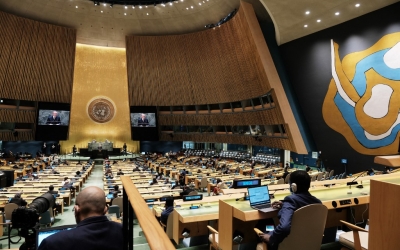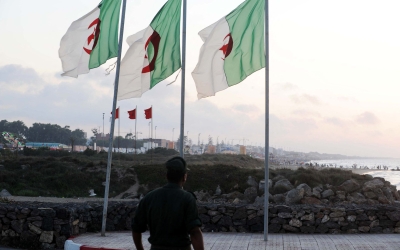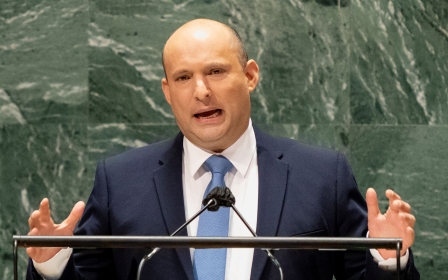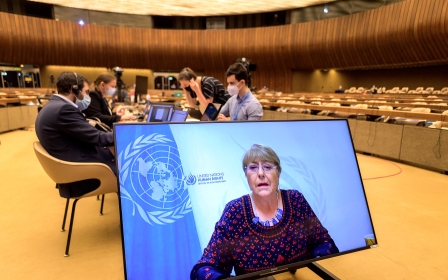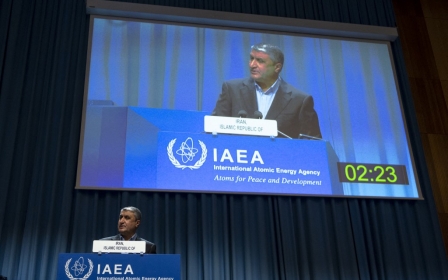UN General Assembly 2021: Here's what Middle East leaders said on final day of summit
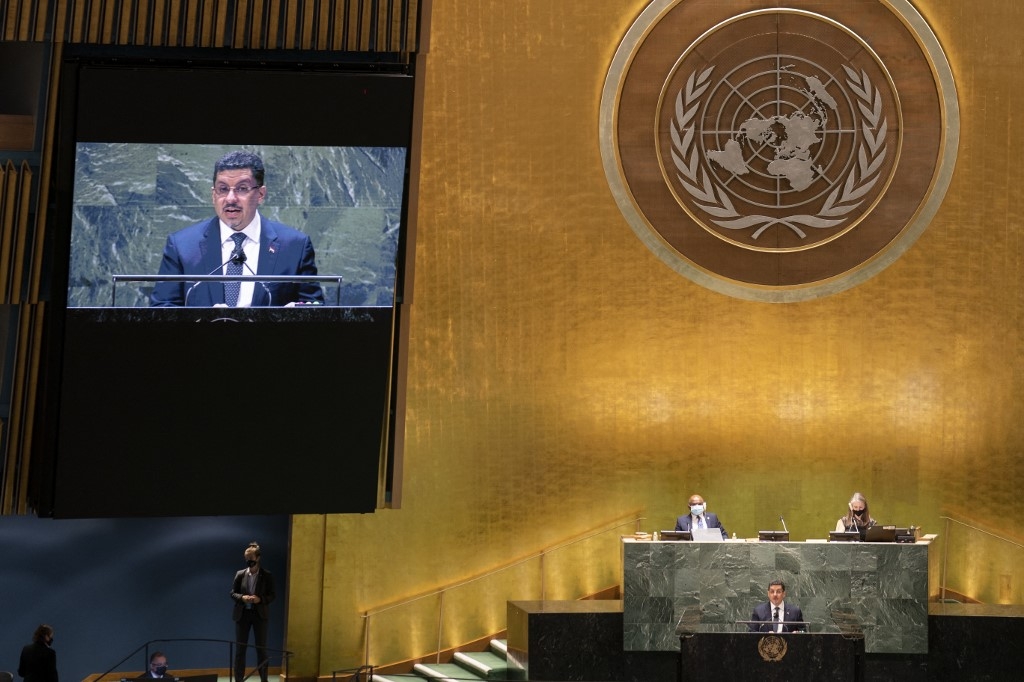
World leaders spoke at the sixth and last day of the United Nations General Assembly on Monday, with officials from Israel, Syria and Yemen striking a defiant tone.
While the Covid-19 pandemic took centre stage as the main issue of this year's debate, nine countries from the Middle East addressed the international body on issues ranging from Iran's nuclear programme, the wars in Libya, Syria and Yemen, to the dispute over the Western Sahara region.
Here's what they said:
Israel
Speaking at the United Nations General Assembly for the first time, Israeli Prime Minister Naftali Bennett said Iran's nuclear programme, along with Israel's tolerance for it, had hit a "watershed moment" and that his administration would not allow Tehran to acquire a nuclear weapon.
New MEE newsletter: Jerusalem Dispatch
Sign up to get the latest insights and analysis on Israel-Palestine, alongside Turkey Unpacked and other MEE newsletters
"Iran's nuclear programme has hit a watershed moment, and so has our tolerance," Bennett said. "Words do not stop centrifuges from spinning."
Bennett, a far-right politician who ended Benjamin Netanyahu's 12-year run as prime minister in June, has urged US President Joe Biden to harden his stance against Iran, Israel's regional arch-foe.
Bennett opposes the Biden administration's efforts to revive the 2015 Iran nuclear deal that former US President Donald Trump abandoned in 2018.
Bennett's fierce assault on Iran was reminiscent of the UN speeches made by Netanyahu, albeit without the props and visual aids.
In 2012, Netanyahu held up a poster of a cartoon bomb and drew a literal red line with a marker to symbolise Iran's nuclear activities.
In his address, Bennett pledged to do whatever is necessary to prevent Iran from building a nuclear weapon which Iran repeatedly denies pursuing.
Syria
Syria's foreign minister said his country's doors were open for the safe return of refugees and accused western nations of taking advantage of the suffering of Syrians while pretending to care for their well-being.
"We have made it clear that Syria's doors are wide open for the safe and voluntary return of all refugees to their country. All relevant institutions in Syria are tirelessly working towards that goal," Foreign Minister Faisal Mekdad claimed.
He added that "the so-called cross border aid mechanism must be shut down following incidents of corruption and failures".
In July, the UN Security Council agreed to extend a cross-border aid operation into Syria from Turkey for a further 12 months. Syria, Russia and China have worked to block certain border crossings to impede aid access to rebel-held territories.
The Bab al-Hawa crossing is currently the sole lifeline for millions of people in Syria's northwest who live in areas outside government control.
In his address, Mekdad also claimed that Turkey and the US were looting Syria's natural resources and that any reforms should be Syrian-led.
"Turkish and US forces continue to occupy Syrian territories under false pretexts and they're looting the natural resources of the Syrian people. [This] should end immediately without any preconditions," he said.
Yemen
Yemen's Foreign Minister Ahmed Awad bin Mubarak took a hard stance against Houthi forces during his address and reiterated support for a UN-led peace process.
"This war forced on our people culminated into a humanitarian catastrophe, dismembered the Yemeni society and triggered waves of mass displacement, oppression, forced disappearances, and unprecedented destitution," he said.
Mubarak added that Iran's support for the Houthis continued "to be part of the problem".
The conflict, now in its seventh year, has seen intensified fighting in the city of Marib, a key battleground and the government's last stronghold in the country's oil-rich north.
The war between the Saudi Arabia-led military coalition, which backs the government, and the Houthis has killed more than 230,000 people and forced millions from their homes.
In his address, Mubarak also said the war-torn country needed more coronavirus vaccines, saying the roughly 1 million doses it was given were not enough to vaccinate even the most vulnerable portions of the population.
"These amounts are still not enough to cover the targeted groups," Mubarak said. "We hope that the donating countries will contribute to increasing the number of vaccines so that no one is left behind."
United Arab Emirates
The United Arab Emirates' minister of state for foreign affairs, Khalifa Shaheen al-Marar, called for an end to armed conflicts across the Middle East, including in Yemen, Syria and Libya.
"We stress here that ensuring full respect for the sovereignty of Arab countries and reaching comprehensive political solutions under the auspices of the United Nations remain the only way to end the crises in the region," Marar said.
He also praised Israel's US-brokered normalisation with the UAE, saying that Abu Dhabi will use the relationship with Israel "to stimulate economic growth and advance prosperity and stability for the people in the region".
The UAE has claimed the normalisation would ultimately benefit the Palestinians, who have denounced the agreement. Palestinians have said such an agreement should not occur while Israel continues to occupy and expand settlements on Palestinian land.
Israel's Bennett met with the UAE and Bahrain on the sidelines of the General Assembly on Sunday.
On Iran, Marar said that any future agreement between world powers and the Islamic Republic on its nuclear programme "must involve the countries of the region".
Algeria
Algerian Foreign Minister Ramtane Lamamra's speech at the General Assembly on Monday focused on a call to the international body to hold a referendum on self-determination for the disputed region of Western Sahara.
"Algeria reaffirms its support for the rights of the Sahrawi people to self-determination, and we call upon the United Nations to assume their legal responsibilities towards the Sahrawi people and guarantee their inalienable rights."
Lamamra said that the organisation of a referendum on the future of the Western Sahara "cannot forever be taken hostage by the intransigence of an occupying state", in an apparent reference to Morocco.
The UN has repeatedly failed to find a lasting settlement since it brokered a ceasefire on the line of control in 1991 and established the UN Mission for the Referendum on Western Sahara (Minurso), a peacekeeping force mandated to hold a referendum on Sahrawi self-determination.
Rabat insists on its right to govern Western Sahara, while Algiers backs the Polisario Front's demands for a referendum under the auspices of the United Nations. Algeria also hosts refugees from the region.
The issue has led to a heightening of tensions between the North African neighbours, with Algeria severing diplomatic relations with Morocco last month, citing a series of "hostile manoeuvres" by Rabat.
Tunisia
Tunisia's foreign minister addressed the ongoing political situation in the country, where President Kais Saied last week took measures to further strengthen his political office after suspending parliament in July, a move his opponents labelled as a coup.
Othman Jerandi, minister of foreign affairs for Tunisia, said that the country is facing "a deeply rooted political polarisation and socio-economic and health crisis", and that is why Saied took the measures, adding that they were done to "put the country back on the right path towards democracy".
"There is no way to establish a genuine democratic system without fighting corruption and ending impunity, which have exhausted and weakened our state as institutions and judicial system."
Over the weekend, several thousand people gathered in the country's capital Tunis to protest against Saied's seizure of governing powers and called on him to step down.
Jerandi also said that Tunisia would work to provide support to its neighbour Libya, so "they complete the political track and meet their expected political and electoral obligations".
The UN-led process in Libya provides a mandate to guide the North African country to elections on 24 December. However, the parliament in eastern Libya passed a no-confidence vote last week in the country's unity government that has dealt a blow to peace efforts aimed at ending ten years of violence after the fall of dictator Muammar Gaddafi.
Middle East Eye delivers independent and unrivalled coverage and analysis of the Middle East, North Africa and beyond. To learn more about republishing this content and the associated fees, please fill out this form. More about MEE can be found here.


